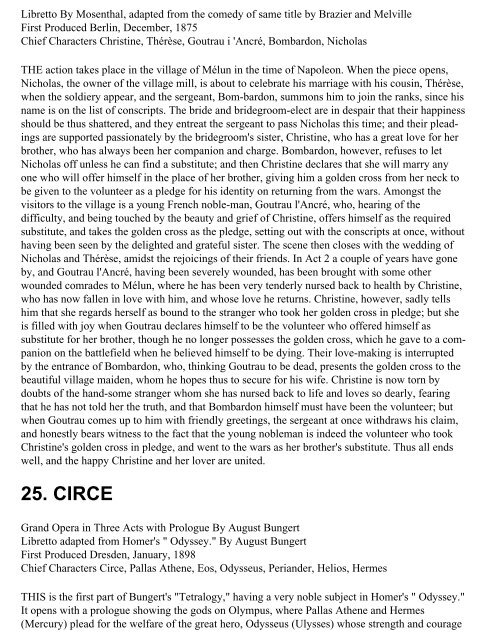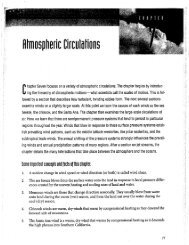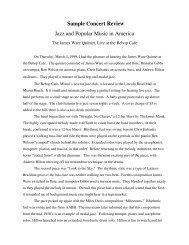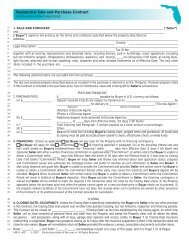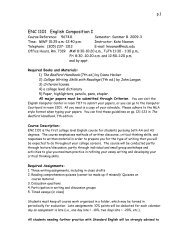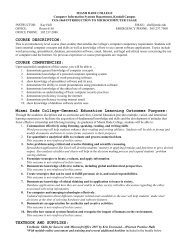Opera Plots I - MDC Faculty Home Pages
Opera Plots I - MDC Faculty Home Pages
Opera Plots I - MDC Faculty Home Pages
You also want an ePaper? Increase the reach of your titles
YUMPU automatically turns print PDFs into web optimized ePapers that Google loves.
Libretto By Mosenthal, adapted from the comedy of same title by Brazier and Melville<br />
First Produced Berlin, December, 1875<br />
Chief Characters Christine, Thérèse, Goutrau i 'Ancré, Bombardon, Nicholas<br />
THE action takes place in the village of Mélun in the time of Napoleon. When the piece opens,<br />
Nicholas, the owner of the village mill, is about to celebrate his marriage with his cousin, Thérèse,<br />
when the soldiery appear, and the sergeant, Bom-bardon, summons him to join the ranks, since his<br />
name is on the list of conscripts. The bride and bridegroom-elect are in despair that their happiness<br />
should be thus shattered, and they entreat the sergeant to pass Nicholas this time; and their pleadings<br />
are supported passionately by the bridegroom's sister, Christine, who has a great love for her<br />
brother, who has always been her companion and charge. Bombardon, however, refuses to let<br />
Nicholas off unless he can find a substitute; and then Christine declares that she will marry any<br />
one who will offer himself in the place of her brother, giving him a golden cross from her neck to<br />
be given to the volunteer as a pledge for his identity on returning from the wars. Amongst the<br />
visitors to the village is a young French noble-man, Goutrau l'Ancré, who, hearing of the<br />
difficulty, and being touched by the beauty and grief of Christine, offers himself as the required<br />
substitute, and takes the golden cross as the pledge, setting out with the conscripts at once, without<br />
having been seen by the delighted and grateful sister. The scene then closes with the wedding of<br />
Nicholas and Thérèse, amidst the rejoicings of their friends. In Act 2 a couple of years have gone<br />
by, and Goutrau l'Ancré, having been severely wounded, has been brought with some other<br />
wounded comrades to Mélun, where he has been very tenderly nursed back to health by Christine,<br />
who has now fallen in love with him, and whose love he returns. Christine, however, sadly tells<br />
him that she regards herself as bound to the stranger who took her golden cross in pledge; but she<br />
is filled with joy when Goutrau declares himself to be the volunteer who offered himself as<br />
substitute for her brother, though he no longer possesses the golden cross, which he gave to a companion<br />
on the battlefield when he believed himself to be dying. Their love-making is interrupted<br />
by the entrance of Bombardon, who, thinking Goutrau to be dead, presents the golden cross to the<br />
beautiful village maiden, whom he hopes thus to secure for his wife. Christine is now torn by<br />
doubts of the hand-some stranger whom she has nursed back to life and loves so dearly, fearing<br />
that he has not told her the truth, and that Bombardon himself must have been the volunteer; but<br />
when Goutrau comes up to him with friendly greetings, the sergeant at once withdraws his claim,<br />
and honestly bears witness to the fact that the young nobleman is indeed the volunteer who took<br />
Christine's golden cross in pledge, and went to the wars as her brother's substitute. Thus all ends<br />
well, and the happy Christine and her lover are united.<br />
25. CIRCE<br />
Grand <strong>Opera</strong> in Three Acts with Prologue By August Bungert<br />
Libretto adapted from <strong>Home</strong>r's " Odyssey." By August Bungert<br />
First Produced Dresden, January, 1898<br />
Chief Characters Circe, Pallas Athene, Eos, Odysseus, Periander, Helios, Hermes<br />
THIS is the first part of Bungert's "Tetralogy," having a very noble subject in <strong>Home</strong>r's " Odyssey."<br />
It opens with a prologue showing the gods on Olympus, where Pallas Athene and Hermes<br />
(Mercury) plead for the welfare of the great hero, Odysseus (Ulysses) whose strength and courage


